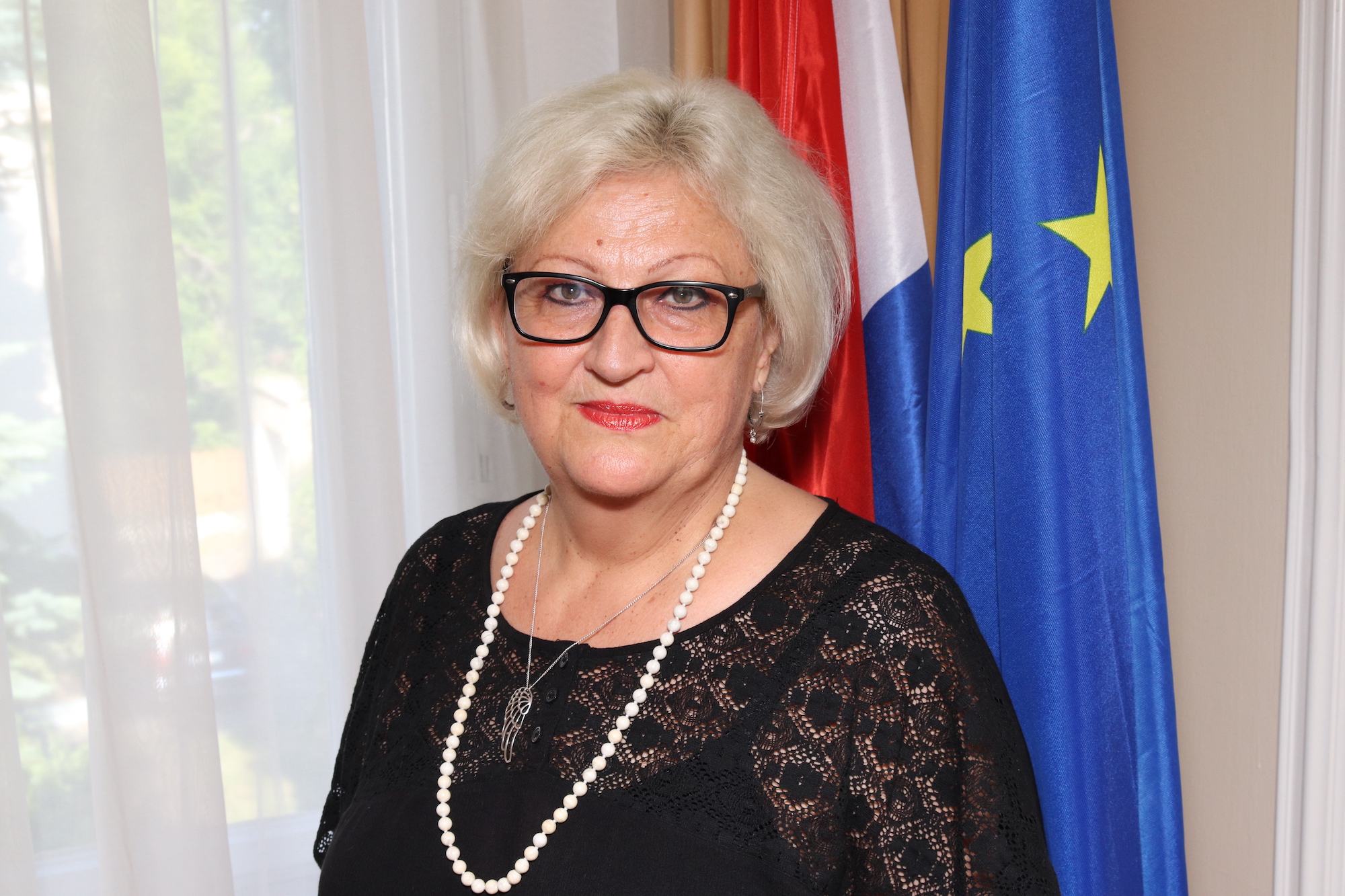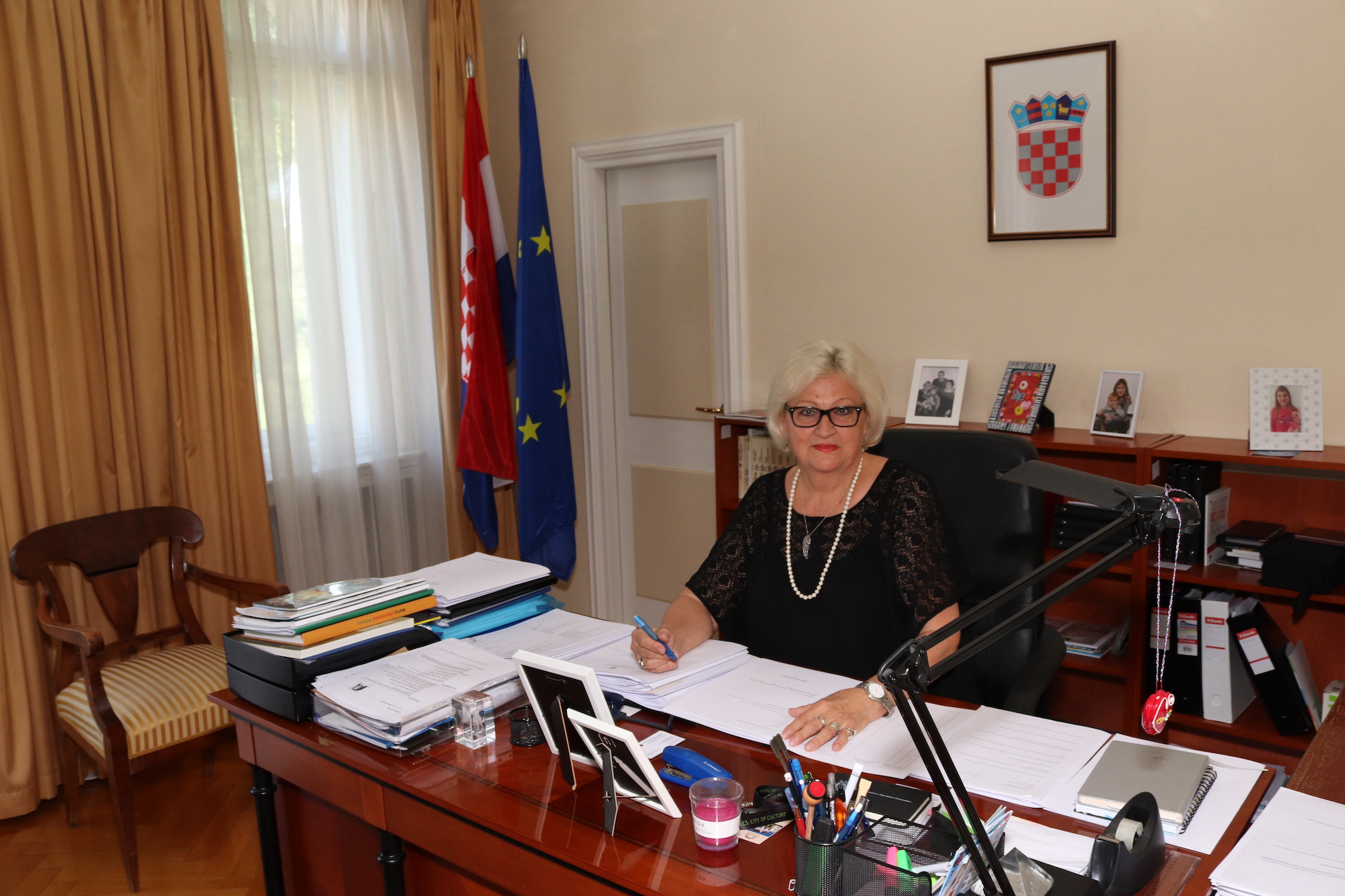“Diplomats are experts in many fields”

H.E. Ljiljana Pancirov, Ambassador of Croatia
Text: Martina Hošková and M. Zisso; Photo: Zuzana Hubinková
I have chosen Croatia as my summer holiday destination quite a few times, which obviously makes me a typical Czech. I sure did enjoy the sea and atmosphere in Poreč, Pula, Omiš, and elsewhere.
It is my pleasure to give space to the Croatian ambassador Ljiljana Pancirov on the pages of our magazine so that we can learn about her diplomatic experience in our country, think about her advice to the new generation of ambassadors, and feel flattered when she appreciates our care of Czech cultural heritage. The ambassador herself feels that “it was my destiny to come to this very country as an ambassador”.
Can you please tell us a bit about yourself and the rich professional background you have developed so far?
I was born in Zagreb and have lived in that wonderful city all my life, except when I accepted my diplomatic duties. I have had experiences in Den Haag, the Netherlands; Helsinki, Finland (while also covering Estonia); then Pécs, Hungary; and I am now placed in Prague. My main education is in humanities, literature, and languages, with an additional flavour of economics, which I took as my postgraduate choice for some time.
Should I go into more detail about my rich professional background, as you say, I can mention several assignments. For years, I worked in the international science project management during the wartime as a personal secretary to the President of the Republic. I then became a director of international relations at Zagreb University, and finally entered the diplomatic service in the Ministry for Foreign and European Affairs. Our state was young in the 1990s and we were creating our own, modern, Croatian diploma- tic service. In the ministry I was heading a Department for Northern and Western Countries, a Department for Diplomatic Education at the Diplomatic Academy, and a Department for Analytics and Policy Planning – a varity of different topics, all being an excellent basis for the work abroad that followed. In diplomacy, one has to be an expert not only in politics and economy, but also in education, culture, security, the IT sector, and many other very specific fields.
I am also a proud mother to my daughter Željana and my son in law Rutger, who, as a Dutchman, brought an intercultural environment to our family. My biggest love and creatures that adore me most are my grandchildren, Mara and Tigo. Whoever read Babička by Božena Němcová would understand our relationship and the importance of a granny’s love.
How do you perceive your long diplomatic work experience? Has it changed you as a person?
Let me start deep back in history. As I have already mentioned, I was born in Zagreb, the capital of Croatia, where the first Bishop in the 11th century was Duh, the first known Czech in Zagreb. We might say that in his personality we have the beginning of Croatian and Czech ties and a friendship between the two nations that has lasted for centuries, even today. Indisputably, my destiny was to come to this very country, Czechia, and be a Croatian representative on the level of ambassador.
Since I come from the continental part of Croatia under the influence of the Central European cultural circle, it is no wonder that living in Prague made my life comfortable and nice, and that I have felt at home since the very first days of my mandate. When you are an ambassador in a country with which there are no open political issues then you have an easy job to keep the relations going smoothly and in a friendly mood. During my long career I have been a high ranked diplomat, then Chargé d’Affaires for over a year, a Consul General, and finally an ambassador. I call it the crown of my diplomatic achievements, and highly appreciate the position. My personality is the same as it was before, I like to keep it unchanged, but the feeling that you can make the final decision, even take the responsibility for it, makes you proud of your accumulated experience leading you in the right direction and to the final positive results. When everything is finished, when all the titles go and the red carpet vanishes, what is left behind is the judgement of you, the memories you created with your collaborators, colleagues, and friends, and yes, if positive, this is the most precious feeling that overwhelms you.
You have been in the Czech Republic for three years. Can you share some of your impressions?
As I have already said, Czechia is deep in my heart and is very familiar to me and my mentality. The Coronavirus prevented me from travelling around more than I really wanted, but I still saw various parts of this beautiful country. I am impressed with how all the castles and fortresses are well kept, and I have a feeling that every town has one. Prague is beyond any imagination. I read legends about its secret places; I like to wander through its narrow streets, to enjoy the sound of the Vltava, and to mingle through the parks and green areas. My special love is South Moravia. Our autochthonous minority (Moravian Croats live around Mikulov and Břeclav and came to this area in 1533) live in this beautiful and vivid area, which is very similar to their primary homeland.
Relations between the two countries are excellent, stable, and unburdened with open issues, based on common cultural heritage, historical experience, and respect for common European values. The economic cooperation has intensified in recent years, including big investment projects, but the economic field always gives space for further enhancement. We have very active minorities who are among many bonds that bring us closer. Czechs in Croatia are the most active Czech minority outside the Czech Republic..

H.E. Ljiljana Pancirov, Ambassador of Croatia
Croatia is the biggest holiday destination for Czech people. How do you, as an ambassador, help promote your country?
Czech people actually established tourism in Croatia at the end of the 19th century. Have a look at the short Jiří Menzel’s documentary Vaše moře, naše moře and you will learn a lot about the history of the tourist industry. What I am saying by this is that the Czechs know Croatia, Croatian people, and basically our tourist potential. Anyway, I still give a lot of interviews in various media outlets, talk at tourist presentations, and use every opportunity to inform people about how beautiful, safe and reliable we as a tourist destination are. War operations in the 1990s, Coronavirus lockdown – nothing could have prevented our Czech friends from coming and enjoying summers at the Adriatic. Nowadays, you are becoming exclusive tourists. We want the Czechs to be present more and more throughout the whole year, not only at the seaside but also the inland of the country. We welcome the fact that many Czechs decided to become investors in Croatia.
We go on holiday to Croatia, what do you do during your free time in our country?
Being an ambassador does not give you a lot of free time, even during weekends. Surrounded by people all the time, in the office, at social gatherings, gives you little time for yourself. These precious personal moments I keep for my closest friends and for me, myself. I believe I am a good cook. I like various kinds of music, getting emotional peace by reading books, and enjoying natural beauty. Nordic walking is a welcome activity and reminds me of my Finnish times.
Can you give some advice to the next generations of ambassadors?
My piece of advice follows my lifeline behaviour, and it says: “Be human, remain what you really are, study all your life because knowledge is upgraded every minute and you have to be in. Do not think that you are above others, you are just first among equals. Do not look at other people von oben, every person is a value by itself, which might at some time be valuable to you too. Ambassadors are a kind of managers, but in order to be good and successful ones they have to have the right information and a wide knowledge. The richness of personality is of utmost importance. And above all, they have to be respectable. Just a pose, does not count”.
The EU presidency of the Czech Republic starts on 1 July this year. What are you, as a representative of your country, expecting?
Croatia, as the youngest European Union state (since 2013) started presiding over the EU Council in the first part of 2020 and succeeded in solving European issues in the best possible way. It was a very complicated time burdened with the start of the Covid pandemic and its consequences worldwide, and at the same time Croatia was struck by an earthquake. Czechia is preparing very seriously for the presidency, and I believe that the results will be the best possible. War in Ukraine and the energy crises will be among the main topics for sure. Croatia is always open to sharing its presidential experiences with its Czech friends.
This interview is taken on the occasion of your national day. What are your wishes in this regard?
On 30th May 1990 the first democratically elected multiparty state parliament was constituted and therefore this date we celebrate as a Croatian National Day. The year 2022 has an additional meaning as we also celebrate 30 years of the international recognition of the Republic of Croatia, starting on 12th January when the European Community recognized Croatia, and many other countries followed. It has been very important to us because Croatia had a difficult path to freedom and suffered irreparable losses during the war. My wish for peace, stable democracy and security, economic prosperity, and peoples’ wellbeing goes to my own country, but also to all of the likeminded states.

